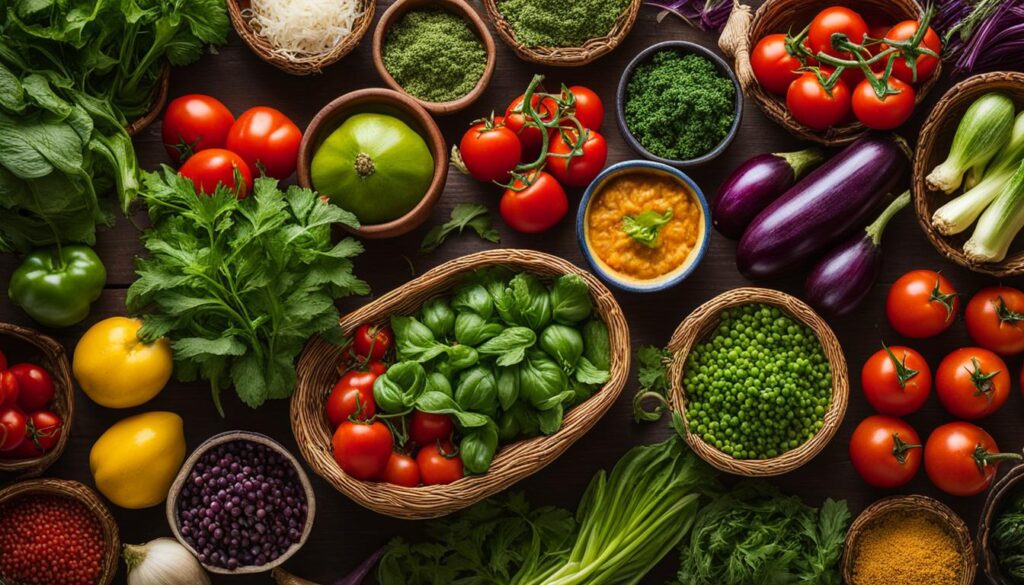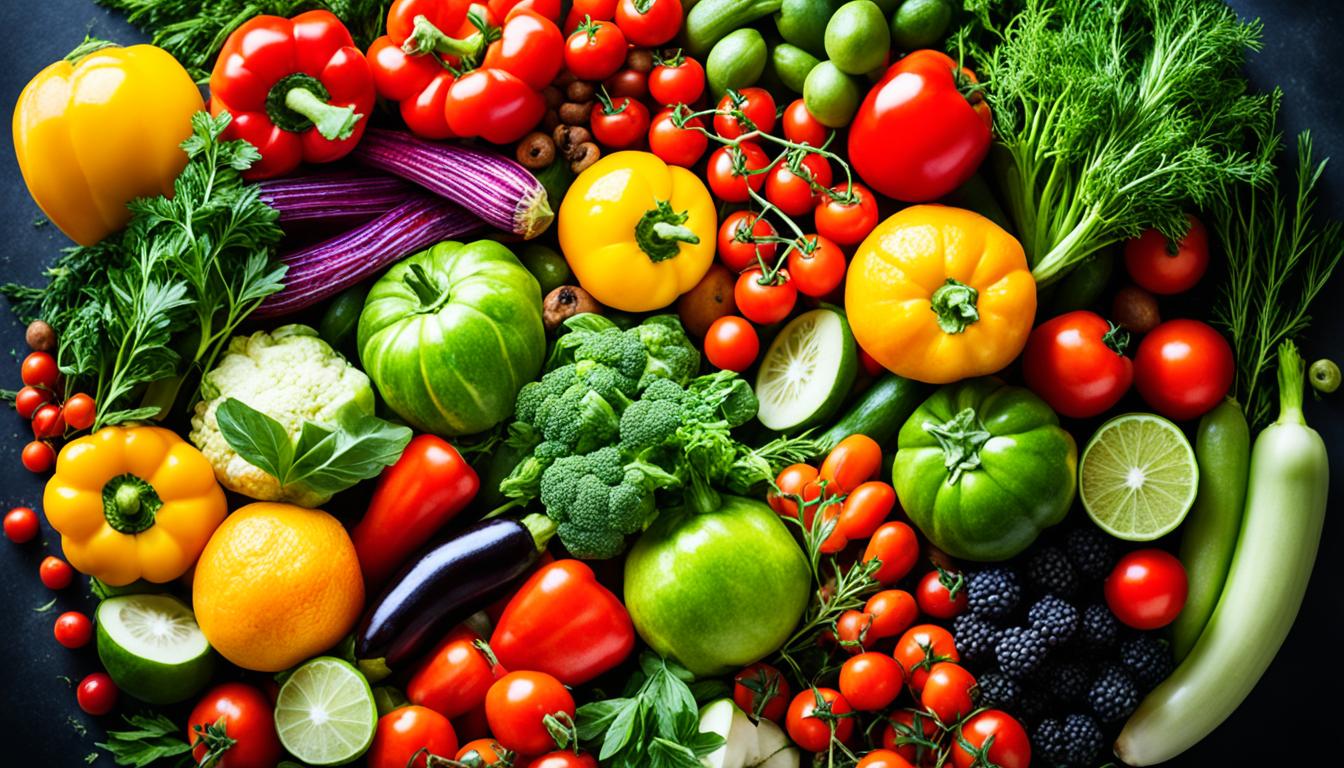Are you tired of bland, lackluster meals? It’s time to take your cooking to the next level with the power of fresh ingredients. Incorporating the best produce available can add a vibrancy and depth of flavor to your culinary creations that simply can’t be beat.
But what exactly are fresh ingredients, and why are they so important? In this article, we’ll explore the numerous benefits of using fresh ingredients, where to source them, and even share some creative ways to use them in your dishes.
Key Takeaways:
- Fresh ingredients can enhance the flavor and nutrition of your meals
- There are many options for sourcing fresh produce, including farmers’ markets and specialty stores
- Using ingredients that are in season can help support local agriculture and enhance taste
- Proper storage is key to maximizing the lifespan and quality of fresh ingredients
- Even on a budget, incorporating fresh ingredients can be accessible and delicious
The Benefits of Using Fresh Ingredients
If you’ve ever tasted a dish made with fresh ingredients, you know just how much of a difference it can make. But did you know that using fresh produce can also have a range of benefits beyond just superior taste and texture?
For one, fresh ingredients are often more nutritious than their processed counterparts. This is because they haven’t been stripped of their natural vitamins and minerals through processing and preservation. By incorporating fresh produce into your meals, you can increase the overall nutritional value of your diet.
In addition, cooking with fresh ingredients allows you to have greater control over the quality of your meals. By selecting the freshest and best-quality produce, you can ensure that your dishes are made with the highest-quality ingredients.
Furthermore, cooking with fresh ingredients is a great way to support local agriculture and reduce your environmental footprint. By purchasing fresh produce from local farmers or at farmers’ markets, you can reduce the distance that your food travels and support small-scale, sustainable agriculture.
Overall, incorporating fresh ingredients into your cooking can have a wide range of benefits for both your health and the environment.
Where to Source Fresh Ingredients

One of the keys to cooking with fresh ingredients is sourcing them from the right places. For the freshest produce, look no further than your local farmers’ market. Here, you can find an array of seasonal fruits and vegetables that are picked at the height of their ripeness. Not only are you supporting local agriculture, but you’re also reducing food miles and increasing the sustainability factor of your cooking. If farmers’ markets aren’t readily available in your area, specialty grocery stores are a good alternative. These shops typically carry a wide variety of high-quality produce, including exotic fruits and hard-to-find herbs.
When sourcing your ingredients, be sure to examine them closely. Look for produce that’s firm and brightly colored, with no soft spots or signs of decay. Smell fruits and vegetables to check for freshness and ripeness. If you’re unsure about a particular item, ask a staff member for assistance.
Remember, using fresh ingredients can truly transform the flavor and quality of your meals. Take the time to source the best produce available and experiment with different flavors and combinations. Your taste buds (and your body) will thank you!
Seasonality and Fresh Ingredients
When it comes to using fresh ingredients, seasonality plays a critical role in enhancing the flavors of your dishes. By selecting ingredients that are in season, you not only get the best taste but also support local farmers. Eating seasonally produces less waste and requires fewer resources since there’s less need for preservation methods and transportation to bring the produce to you.
If you’re wondering which ingredients are in season, check your local farmers’ market or research seasonal produce guides specific to your area. And once you’ve identified what’s in season, make the most of it! Incorporate fresh, in-season produce into your meals to savor the flavors at their peak.
Every season has something wonderful to offer in the kitchen, so let’s embrace the abundance of fresh ingredients nature provides us with!
Fresh Ingredients for Every Cuisine

When it comes to cooking delicious meals, fresh ingredients are key. But did you know that different cuisines call for specific fresh ingredients? In this section, we’ll take a culinary trip around the world and explore some of the must-have fresh ingredients for each cuisine.
Mediterranean Cuisine
Mediterranean cuisine offers an abundance of fresh flavors, with herbs and spices such as basil, oregano, and thyme being the stars of the show. Other essential fresh ingredients include tomatoes, cucumbers, olives, and garlic.
Asian Cuisine
Asian cuisine is known for being packed with fresh vegetables and vibrant flavors. Some of the essential fresh ingredients include bok choy, cilantro, lemongrass, ginger, and garlic. Fresh herbs such as Thai basil and mint are also commonly used in dishes such as pho and Thai curries.
Mexican Cuisine
Mexican cuisine is all about bold, spicy flavors. Fresh ingredients such as jalapeños, tomatillos, cilantro, and avocado are essential for creating delicious dishes such as guacamole and salsa. Tomatoes, onions, and peppers are also commonly used in Mexican cuisine.
Indian Cuisine
Indian cuisine is renowned for its complex layers of flavors and aromas. Fresh ingredients such as ginger, garlic, coriander, and cumin are essential for creating dishes such as curries and biryanis. Other important fresh ingredients include tomatoes, onions, and ghee.
Remember, using fresh ingredients is the key to creating delicious and authentic dishes from around the world. So next time you’re cooking up a storm, don’t forget to stock up on the best produce!
Essential Fresh Ingredients for Home Cooking
Using fresh ingredients is not only essential for creating delicious meals, but it can also significantly improve the nutritional value of your dishes. Here are some must-have fresh ingredients for every home cook:
| Ingredient | Usage |
|---|---|
| Herbs | Add flavor and aroma to your dishes. |
| Citrus | Add a tangy, acidic flavor and a dose of vitamin C. |
| Leafy Greens | Provide essential vitamins and minerals and add color and flavor to salads and soups. |
| Berries | Perfect for topping off desserts, adding a sweet, tart flavor and a healthy dose of antioxidants. |
| Garlic and Onion | Used as a base for many dishes, these add depth and flavor to your cooking. |
These ingredients work well in a variety of dishes and can be used to create a vast array of flavors. Incorporating these fresh ingredients into your home cooking is the perfect way to add a boost of flavor and nutrition to your meals.
Creative Ways to Use Fresh Ingredients
Are you tired of the same old recipes? It’s time to let your creativity shine in the kitchen! Fresh ingredients are versatile and can be used in many delicious and unexpected ways. Here are some ideas to inspire your culinary experiments:
| Recipe | Ingredients |
|---|---|
| Fresh Herb Salad | Arugula, mint, basil, and lemon juice |
| Homemade Salsa | Tomatoes, onions, cilantro, and lime juice |
| Grilled Fruit Skewers | Pineapple, peaches, and honey |
For a savory twist on sweet fruit, grill them and serve as a delicious side dish. Fresh herbs can add depth of flavor to salads, sandwiches, and even cocktails. And, with homemade salsa, you can customize the spice level and experiment with different ingredient combinations.
Using fresh ingredients in unexpected ways allows you to elevate any dish and will surely impress your friends and family.
Don’t be afraid to try new things and add your own unique twist to classic recipes. The possibilities with fresh ingredients are endless!
Storing Fresh Ingredients Properly
Proper storage is key to maintaining the freshness of your ingredients for as long as possible. Follow our tips to ensure your produce stays at their peak and maximize their shelf life:
1. Keep it cool
Most vegetables and fruits prefer cooler temperatures, so store them in a refrigerator or a cool, dark place. Keep greens and herbs in an airtight container with a moist paper towel to maintain their crispness.
2. Know your ethylene producers
Some fruits emit ethylene gas as they ripen, which can cause nearby produce to spoil faster. Keep ethylene producers like apples, avocados, and bananas separate from other fruits and vegetables.
3. Don’t wash until ready to use
Washing produce before storage can hasten spoilage, so only wash them right before using. Exceptions are berries, which should be washed and dried before refrigeration to prevent mold growth.
4. Freeze for later
If you can’t use certain ingredients before they spoil, freeze them instead. Many fruits and vegetables freeze well and can be used for soups, stews, and smoothies later on.
«Proper storage is one of the simplest yet most impactful ways to extend the life of your fresh ingredients and reduce unnecessary food waste.»
Fresh Ingredients and Sustainability
Using fresh ingredients not only enhances the flavor of your dishes, but it also supports sustainability in the food industry. By choosing produce that is grown locally, you reduce the carbon footprint associated with long-distance transportation and help to support local farmers. Additionally, fresh ingredients are often grown without the use of harmful pesticides and chemicals, which can have a negative impact on the environment.
To further reduce waste, consider buying only the amount of fresh produce that you need and using leftover scraps for composting. Embracing sustainability in your cooking practices can have a positive impact on both your health and the environment.
«Sustainability isn’t just about adopting the latest energy-efficient technologies or turning to renewable sources of power. Sustainability is the responsibility of every individual every day. It is about changing our behaviour and mindset to reduce power and water consumption, thereby helping to control emissions and pollution levels. — Piyush Goyal
Fresh Ingredients on a Budget
Some people believe that fresh ingredients are too expensive to incorporate into their meals, but this is far from the truth. There are plenty of ways to enjoy fresh produce without breaking the bank. Here are some tips:
Shop Seasonally
Fresh produce is usually cheaper when it’s in season, so try to plan your meals around what’s abundant in your area. Not sure what’s in season? Check out this handy seasonal food guide to find out what’s fresh and available in your region.
Buy in Bulk
Buying produce in bulk can often save you money in the long run. If you’re planning on making a big batch of salsa or soup, look for deals on bulk items like tomatoes or onions. Just make sure you have a plan for how you’ll use everything before it goes bad.
Shop at Discount Stores
Many discount retailers offer fresh produce at a fraction of the cost of traditional grocery stores. While the selection might not always be as extensive, it’s a great way to save when you’re on a tight budget. Just be sure to inspect the produce carefully to make sure it’s fresh and in good condition.
Grow Your Own
One of the most budget-friendly ways to get fresh produce is to grow it yourself. Even if you don’t have a green thumb, there are plenty of easy-to-grow fruits and veggies that are perfect for beginners. Start with herbs like basil or mint, or try your hand at growing tomatoes or peppers.
Don’t let cost be a barrier to incorporating fresh ingredients into your meals. With a little bit of planning and creativity, you can enjoy the flavors and benefits of fresh produce without breaking the bank.
Conclusion
In conclusion, incorporating fresh ingredients into your cooking can truly take your culinary creations to the next level. Not only do fresh ingredients enhance the flavors, textures, and nutritional value of your meals, but they also support local agriculture and contribute to a more sustainable food system.
By sourcing fresh ingredients from local farmers’ markets or specialty grocery stores and using produce that is in season, you can ensure the highest quality ingredients in your meals. And while some fresh ingredients may come at a premium price, there are strategies to make freshness accessible to all, such as finding affordable options or taking advantage of seasonal discounts.
Finally, with a little creativity, fresh ingredients can be used in exciting and innovative ways to elevate your dishes. From refreshing salads to homemade sauces, the possibilities are endless. So why not experiment with incorporating fresh ingredients into your next meal and experience the incredible impact they can have on your cooking?
FAQ
Why are fresh ingredients important in cooking?
Fresh ingredients are important in cooking because they enhance the flavors of your dishes, add vibrancy to your meals, and contribute to a more nutritious and healthy diet.
What are the benefits of using fresh ingredients?
The benefits of using fresh ingredients include superior taste and texture in your dishes, increased nutritional value, and the ability to support local agriculture and sustainable food systems.
Where can I source fresh ingredients?
You can source fresh ingredients from local farmers’ markets, specialty grocery stores, and even grow your own produce in a home garden.
Why is seasonality important in relation to fresh ingredients?
Seasonality is important because using ingredients that are in season ensures the best flavor and quality of the produce. It also supports local agriculture and reduces the carbon footprint associated with long-distance transportation.
What are some essential fresh ingredients for home cooking?
Some essential fresh ingredients for home cooking include aromatic herbs like basil and thyme, flavorful fruits like tomatoes and lemons, and versatile vegetables like onions and garlic.
How can I creatively use fresh ingredients in my cooking?
You can use fresh ingredients creatively by incorporating them into salads, making homemade sauces and dressings, trying new recipes and flavor combinations, and experimenting with different cooking techniques.
What are the best ways to store fresh ingredients?
The best ways to store fresh ingredients include refrigerating certain produce like leafy greens and berries, storing herbs like basil in water, and keeping fruits and vegetables in separate containers to prevent spoilage.
How do fresh ingredients contribute to sustainability?
Fresh ingredients contribute to sustainability by reducing food miles, supporting local farmers and agricultural practices, and promoting a more environmentally friendly food system.
Can I use fresh ingredients on a budget?
Yes, you can use fresh ingredients on a budget by seeking out affordable options at farmers’ markets or discount produce sections, buying in-season produce, and minimizing food waste through proper storage and meal planning.
